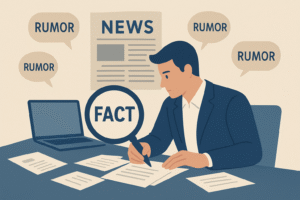Lately, you might have come across social media posts or random blogs claiming that Keir Starmer’s wife, Victoria Starmer, was involved in some kind of accident. The problem is — no one ever shows proof.
As someone who digs deep into stories before believing them, I wanted to look into this carefully and separate fact from fiction. Victoria Starmer isn’t a celebrity chasing headlines; she’s known for keeping her life private while working quietly in healthcare and supporting her husband’s public role.
Yet, in today’s online world, even a single vague post can snowball into a full-blown rumor. So, what’s the truth here? Did anything really happen? Or is this just another case of misinformation spreading faster than facts?
Let’s go through what’s confirmed, what’s not, and why it’s important to rely on real sources instead of viral whispers.
Who Is Victoria Starmer?
I find it helps to start with what’s well-established, so we have a clear foundation.
- Victoria Starmer (née Victoria Alexander) was born in London in the early 1970s. She trained as a solicitor, later shifting her work into occupational health with the NHS.
- She studied law and sociology at Cardiff University, where she was active in student politics, including serving as president of the student union.
- In 2007, she married Keir Starmer. They have two children, whom they have kept largely out of public view.
- She has maintained a relatively private profile, choosing to carry on her professional life rather than becoming a very visible public figure.
Rumours and “Accidents” — What’s Out There
Over time, various claims have emerged on social media or lesser-known outlets about Victoria Starmer, including alleged “accidents” involving her. From what I’ve found in reliable sources:
- There is no credible evidence in major news outlets or verified records confirming any accident involving Victoria Starmer.
- Trusted media sources like the BBC, The Independent, The Guardian, and reputable fact-check outlets have not reported such an incident.
- Some rumours circulate on social media forums or in user-generated content without source citations—these appear to have little or no verification.
So, as of now, the claim that Victoria Starmer had an accident is unsubstantiated.
Why These Rumours Spread
I’ve seen many similar cases, and these are common reasons why unverified stories gain traction:
- Anonymity & Virality: A story starts somewhere without a source, gets shared rapidly, especially if it’s dramatic or emotional. Many people accept it without checking.
- Confirmation Bias: If someone already holds a negative view about a public figure, they are more likely to believe or spread stories that reinforce it—even without proof.
- Misattributed or Outdated Information: Sometimes details from another person’s life, or from past events, get wrongly linked to someone else.
- Lack of Fact-Checking Tools: Not everyone knows how to check whether a source is reliable or whether claims are confirmed by multiple outlets.
- Social Media Algorithms: They tend to amplify content that gets lots of engagement—even if the content is false or misleading.
What Reliable Sources Say vs. What Doesn’t Check Out
Here’s a comparison of what is known vs. what is not proven:
How to Check a Rumour Before Believing It
When I see something that seems “too sensational,” here’s what I do to check:
- Look for mainstream reporting (BBC, Guardian, Reuters, etc.). If they aren’t reporting it, it’s likely not verified.
- Cross-check multiple sources, especially official ones—government, interviews, trusted news.
- Watch for claims citing unnamed “sources”. Often these are vague and can’t be confirmed.
- Check fact-checking websites. In the UK, for example, sites like Full Fact or BBC Reality Check are helpful.
- Check date and context. Sometimes things are taken out of context or are old stories resurfacing.
Why This Matters
I believe this is important for several reasons:
- For public figures, untrue rumours can harm personal reputations and put pressure on family members unnecessarily.
- They distract from real issues—political, policy-focused, or social. Misinformation shifts focus away from what truly matters.
- As consumers of news or followers on social media, we have a responsibility to respond carefully, especially with sensitive personal claims.
Conclusion
Here’s where I stand: from all verified sources, there is no credible information or evidence that Victoria Starmer has had an accident. While rumours may exist online, they are not backed by documentation or reputable reporting.
Victoria Starmer’s story, as reported, is one of education, legal training, work in the NHS, and private but invested family life. She remains a relatively low-profile public figure, which both adds to her privacy and sometimes opens the door for speculation.
If you ever see a shocking claim about someone in the public eye—especially a personal or sensitive one—take a moment. Ask: Who reported this? Can it be confirmed elsewhere? Is this recent? That approach helps us all separate fact from fiction.




